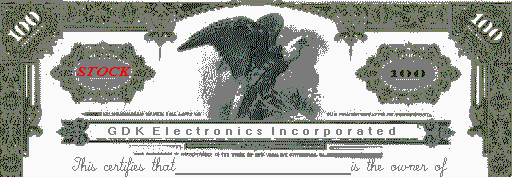
GDK Attaches this code 39 bar to stock certificates for authenticity


GDK Attaches this code 39 bar to stock certificates for authenticity


|
Fair Market
Valuations Whether for establishing a selling price or for other reasons such as partnership issues, tax planning, litigation support, and/or financing support, a Spectrumbusiness.com Fair Market Valuation provides an accurate professional opinion of corporate value. Spectrum valuation clients are able to make sound financial decisions based on factual documentation not arbitrary "rules of thumb," or wishful thinking. Corporate Valuations are an essential starting point for making a range of important business decisions. Many chief executives view a professional corporate valuation as an expense to be borne only when absolutely necessary. In fact, a valuation can be an extremely important wake-up call at the beginning of a strategic planning process, or as crucial leverage in when sourcing capital. When firms include ESOP’s as part of their compensation package an annual valuation can protect both employee and company interests. Other situations that merit valuations include IRS audits, IPO’s, estate planning, creating or dissolving partnerships, and as a prelude to mergers & acquisitions. A professional valuation provides a rigorous and objective analysis of a company that delves beneath financial numbers. The valuation process reveals operational strengths and weaknesses, it challenges assumptions and it develops a defensible basis for value. What is a Corporate Valuation? It is an effort to establish the fair market value at which a reasonably informed and willing buyer would purchase a business in an arms length transaction, in which neither buyer nor seller is compelled to act. There are many very rigorous approaches that professionals use to reach the value of a business entity. Reduced to their simplest terms, valuations follow two very general paths: deriving intrinsic value or relative value. Intrinsic value attempts to determine the present value of future cash flows that a business will generate. Relative value examines companies with similar operations or transactions involving similar businesses to derive a value. Typically a combination of the two is used to create a range of value for the business. Why do rules of thumb have limited use? Just about every industry has rules of thumb for estimating the value of a firm. Rules of thumb make use of a few industry-related metrics to derive a rough estimate of corporate value. Sometimes that is a multiple of operating income or sales. Other times market capitalization, debt and book value are used. However,rules of thumb ignore many crucial questions such as customer relationships, management depth, debt levels, product and process technology and more. Rules of thumb can give owners/shareholders an inflated expectation of value for their business. Chief executives should be very wary of using rules of thumb without understanding all the elements that go into determining fair market value of their business. Our approach to each valuation includes a combination of methods. Since no two businesses are exactly alike (even within the same industry, trade, or service) there is no one formula or "magic multiplier" that is valid. To assure validity and accuracy, we use a comprehensive multi-method approach that considers all relevant factors that are unique to a particular business including but not limited to:
The best test of fair market valuations is the market. Spectrum and its affiliate operations have participated in the successful closing more than 1600 transactions between business buyers and sellers. |
||||||||||||||||||